领导力原则Principles of Leadership review slide set
领导力法则课件
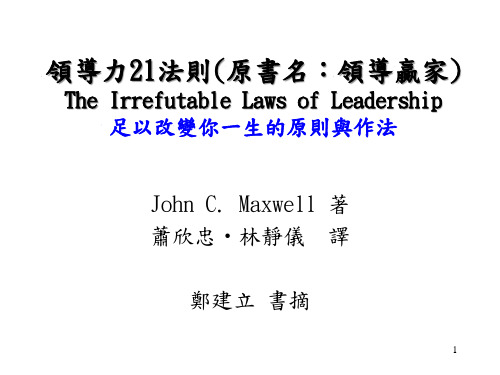
領導成長的四個層次
• 不知道自己有所不知
– 許多人因為不知道自己有所不知,以致潛能 無法發展。
• 知道自己有所不知
– 開始察覺自己對事實的無知,乃是邁向知識 的一大步。──英國手相狄斯雷利
• 成長並且知道,果效就開始顯明 • 隨心所欲,揮灑自如
16
不自覺
領導成長的四個層次
沒有效率
有效率
不知道自己 有所不知
– 在樂觀主義與現實主義、直覺與計畫、信心 與縣實間取得平衡,並不容易,但這就是有 果效的導航領袖所需具備的。
22
導航學中的一課
• 面對前面的暗潮洶湧,我這個作領袖的 若稍有閃失,可能就會有沉船之虞。
23
運用導航策略來設定航程 預先計畫(PLAN AHEAD)
• 預先決定行動綱領。(Prediction a Course of Action) • 列出你的分層目標。(Lay out your Goals) • 設定你的優先順序。(Adjust your Priorities) • 告知所有關鍵人物。(Notify Key Personnel) • 預留時間來取得眾人同意。(Allow time for Acceptance) • 開始行動。(Head into Action) • 預期將會產生的問題。(Expect Problem) • 凸顯每項成功之處。(Always point to Successes) • 每日檢討你的計畫。(Daily review your Plan)
8
2.影響力法則
‧衡量一個人的領導力,全看他所發出的 影響力
–她的丈夫擁有一切:財富、特權、地位、皇 儲頭銜。然而不是他,而是她──戴安娜王 妃贏得全世界,為什麼?因為她瞭解「影響 力法則」。
Leadership领导力演示课件
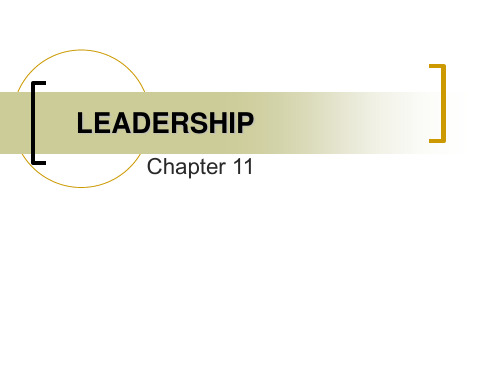
Who Will Lead? (cont)
➢ Demographic background of leaders
▪ Height, weight, & age ▪ Ethnicity ▪ Sex: Bias against women (even thought women
possess more skills needed to be a successful leader).
➢ Practically
▪ productively, economically, idealistically
➢ Personally
▪ interpersonally, ethically, selfishly
➢ Scientifically
▪ empirically, conceptually
FiLedPlerC’s CSonctinagelnecy Theory
➢ High LPC leaders most effective in “moderately” favorable situations
➢ Low LPC leaders most effective in very favorable or very unfavorable situations
Criticisms include most of research was in the lab
Path-Goal Theory (House 1971)
Path-goal theory focuses on the kinds of leader behaviors that allow subordinates to achieve personal and organizational goals
Leadership领导力教学课件
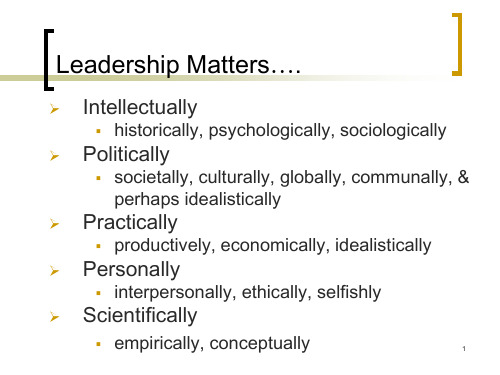
FiLedPlerC’s CSonctinagelency Theory
➢ High LPC leaders most effective in “moderately” favorable situations
➢ Low LPC leaders most effective in very favorable or very unfavorable situations
Leaders are classified as person-oriented or task-oriented (which type will be more effective depends on the leader's degree of situational control)
Control depends on relationship between leader/followers, the degree of task structure, and the leader's authority (position power)
the need for a leader)
4
Leadership myths (cont.)
➢ Leaders make or break their groups
The “romance of leadership” exaggerates the impact of a leader
Leaders do make a difference (e.g., sports teams)
Four leadership styles can be adopted to facilitate employee attainment of goals
2021版亚马逊(Amazon)领导力原则16条

2021版亚马逊(Amazon)领导力原则16条亚马逊(Amazon)创始人杰夫·贝佐斯(Jeff Bezos)于2021年7月5日正式辞去CEO一职,将公司经营管理权交给亚马逊网络服务(Amazon Web Services)首席执行官Andy Jassy。
新旧领导层更迭之后,亚马逊在原有的14条领导力原则的基础上又新增两条,变成了16条。
“有两种类型的公司,一种是为提高价格而工作的公司,一种是为降低价格而工作的公司,我们将成为第二种。
谁说非要盈利呢,我现在可是在做一件大事。
”因为这样的念头,亚马逊以惊人的成长速度创造了一个网络神话,而贝佐斯的身家也水涨船高,他成为了新的世界首富。
对大多数人来说,一旦你真的成为了企业家,就必须确保自己不断向前推进,不断加速,一直做出正确的决策,争取让自己和企业最终获得成功。
你需要很多的指导,还需要有你的团队所坚守的价值观或准则的指导。
亚马逊(Amazon)公司总结了一些领导力原则。
亚马逊的管理层认为:我们的领导力原则不仅仅是非常鼓舞人心的墙帷。
这些准则十分有效,就像我们努力工作所取得的成果一样。
而当你真正运用了这些原则,它们会像军队一样服从你的命令,引导并帮助你理清思绪。
无论是在讨论新项目的创意、决定应对客户问题的最佳解决方案,还是对求职者进行面试,亚马逊人每天都在使用这些领导力原则。
这是令亚马逊独具特色的一个重要因素。
(We use our Leadership Principles every day, whether we're discussing ideas for new projects or deciding on the best approach to solving a problem. It is just one of the things that makes Amazon peculiar.)这些“领导力原则”不仅仅是亚马逊内部员工的工作准则,更是对同学们面试亚马逊时的启示。
领导力-Lesson12Leadership领导力 精品
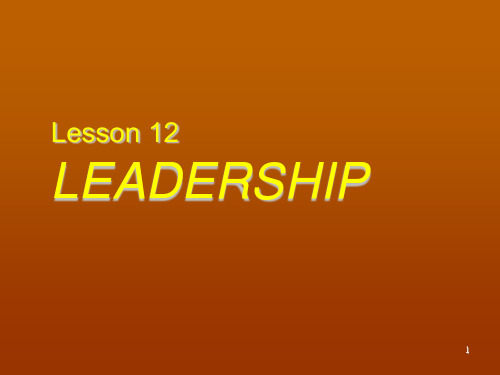
The extent to which the leader shows respect, friendship, concern for followers’ well-being, comfort and mutual respect between leader and followers
Lesson 12
LEADERSHIP
1
Overview
Introduction: What is leadership? Why study leadership?
Historical Developments of Leadership Approaches
Traits Approaches
Personal factors that distinguish the leader, such
as intelligence and appearance.
Cont…
8
Traits Approach
Physical characteristics
This refers to the looks, appearance, grooming of the managers.
16
Participative
Leader allows and expects worker participation Leaders tend to:
Involve subordinates in decision-making through consultation
Asking them for their opinions Share information with subordinates
Leadership领导力课件
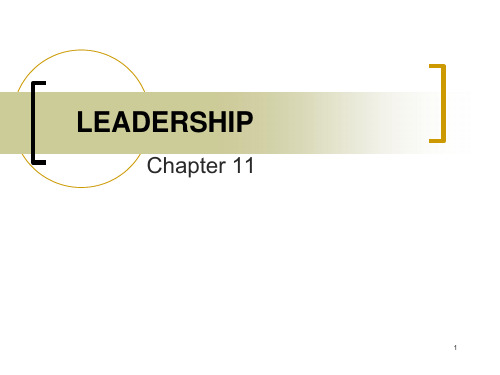
7
The Great Man Theory
➢ Early explanations of leadership studied the “traits” of great leaders
▪ “Great man” theories (Gandhi, Lincoln, Napoleon) ▪ Belief that people were born with these traits and
➢ Practically
▪ productively, economically, idealistically
➢ Personally
▪ interpersonally, ethically, selfishly
➢ Scientifically
▪ empirically, conceptually
He or she may be someone you work with now or someone you knew in the past. This coworker does not have to be the person you like least but should be the person with whom you had the most difficulty in getting a job done.
Criticisms include most of research was in the lab
16
Path-Goal Theory (House 1971)
Path-goal theory focuses on the kinds of leader behaviors that allow subordinates to achieve personal and organizational goals
一个好的领导者应具备条件英文作文
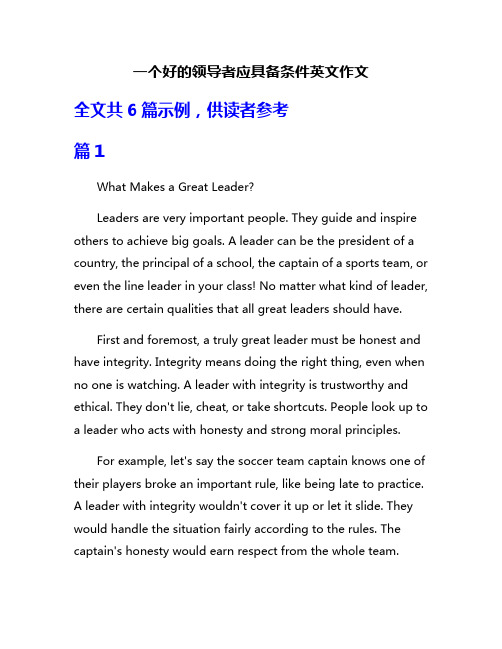
一个好的领导者应具备条件英文作文全文共6篇示例,供读者参考篇1What Makes a Great Leader?Leaders are very important people. They guide and inspire others to achieve big goals. A leader can be the president of a country, the principal of a school, the captain of a sports team, or even the line leader in your class! No matter what kind of leader, there are certain qualities that all great leaders should have.First and foremost, a truly great leader must be honest and have integrity. Integrity means doing the right thing, even when no one is watching. A leader with integrity is trustworthy and ethical. They don't lie, cheat, or take shortcuts. People look up to a leader who acts with honesty and strong moral principles.For example, let's say the soccer team captain knows one of their players broke an important rule, like being late to practice.A leader with integrity wouldn't cover it up or let it slide. They would handle the situation fairly according to the rules. The captain's honesty would earn respect from the whole team.Another key trait of leadership is good communication skills. Leaders need to be excellent speakers and listeners. They must clearly explain their vision and give directions that others can easily understand. Just as importantly, they listen carefully to the concerns and ideas of their team.Imagine if a class president just talked at the students without letting them voice their thoughts. The students would feel ignored and upset. But a leader who updates the class, then stops to hear everybody's input makes people feel valued. With strong communication, the team stays focused and motivated to succeed.Great leaders are also brave and confident, without being arrogant. They remain calm under pressure. They have courage to make tough decisions and stand up for their beliefs. At the same time, truly confident leaders don't need to brag or put others down to feel powerful. They are secure enough to learn from mistakes and change course when needed.Think about explorers like Christopher Columbus. To lead deadly ocean voyages into the unknown required tremendous bravery and confidence in one's abilities. Yet Columbus also had to have the humility to rely on maps, sailors, and maritimeknowledge. Too much unrealistic pride could have led his ships way off course!Furthermore, effective leaders inspire and motivate their followers. They keep the team's spirits up and maintain a positive, can-do attitude even when the going gets tough. With enthusiasm and encouragement, leaders push everyone to work hard and give their absolute best effort.Imagine your class had a big fundraiser coming up. If the leader seemed bored and unenthusiastic, soon the whole group would lose motivation and interest. But a leader who was excited and cheered everyone on would inspire the class to participate wholeheartedly. A motivating leader makes people believe they can overcome any obstacles.Finally, truly great leaders guide and empower others instead of just giving orders. They listen to all ideas, then help teammates build the best unified plan. They provide the tools, training and support for people to develop their skills and leadership potential.It's like the difference between a teacher who just lectures at students, versus one who gets them truly engaged through asking questions and hands-on projects. The most effectiveleaders make everyone feel valued and capable of contributing to the group's mission.In conclusion, the most successful leaders possess several key qualities. They act with integrity, communicate clearly, remain brave and confident, inspire motivation, and empower others to grow as leaders themselves. With these talents, exceptional leaders guide their teams to achieve truly great goals!篇2What Makes a Great Leader?Leaders are very important people. They help guide groups and make sure everyone is working together towards the same goals. Being a leader is a big responsibility. Not just anyone can be a good leader. There are many special qualities that great leaders must have.First and most importantly, a great leader needs to be a really good communicator. They have to be able to explain things clearly so everyone understands what needs to be done. The leader is like the captain of a ship – they need to steer the crew in the right direction by giving easy to follow instructions. Ifthe leader can't communicate well, then the team will get confused and lost.It's also super important for a leader to be a good listener. They can't just bark orders at people all the time. A wise leader listens to the ideas and concerns of the team members. Everyone should feel heard and respected. When the leader listens, it shows they value the thoughts of others. It also helps the leader make better decisions by getting input from many different viewpoints.Another key trait of great leaders is that they lead by example and practice what they preach. It wouldn't be fair for a leader to ask the team to work hard if the leader was lazy and slacking off. The best leaders don't just give orders, they get their hands dirty too and work just as hard (or harder!) than everyone else. When teammates see their leader's work ethic and dedication, it inspires them to give their best effort as well.Speaking of hard work, having lots of energy is crucial for leaders. Being in charge of a team or group is exhausting! There are always meetings, decisions to make, problems to solve, and fires to put out. It takes strength and stamina to keep powering through. Leaders have to be "energizer bunnies" who don't gettired or discouraged easily. Their positive attitude and high energy helps keep the team motivated and fired up.In addition to being hard workers themselves, truly great leaders also empower others and know how to delegate tasks. They can't do everything alone, so they have to trust their team and assign different roles and responsibilities. The best leaders provide training and support to help people succeed in their roles. They celebrate their team's accomplishments and make everyone feel valued and important, not just bossing them around.Having a moral compass and strong ethics is also essential for leadership. A leader's decisions affect lots of people, so they must always strive to be fair and do the right thing, not just what benefits themselves. A leader with integrity gains loyalty and respect from others. People are much more willing to follow a leader they know has strong principles and good judgment.Another big part of being an effective leader is having excellent problem-solving abilities. There are bound to be obstacles and setbacks that come up. The leader needs to calmly analyze the situations, weigh the options, and decide on the best courses of action to overcome the challenges. Great leadersdon't panic or make rash decisions based on emotions. They think things through logically and come up with smart solutions.Speaking of emotions, it's also important for leaders to have emotional intelligence and self-control. There will inevitably be stressful, heated situations that could cause tempers to flare. A leader who can stay cool, calm, and level-headed helps prevent spiraling into chaos. People look to the leader to set the tone. If the leader can keep their emotions in check during rough times, it rubs off on the rest of the team.Despite needing to be level-headed, leaders also need a fun, likeable side that allows them to motivate through positivity. The best leaders know how to celebrate wins, appreciate effort, and keep spirits high through tough stretches. Having a sense of humor and not taking themselves too seriously also makes a leader much easier to follow and approach. Leaders that are warm and approachable foster a much healthier environment than a cold, ruthless boss that everyone walks on eggshells around.Last but not least, humility is a vastly underrated but crucial trait for real leadership greatness. The most effective leaders don't get blinded by their power or arrogantly think they have all the answers. They remain hungry to continue growing andlearning from others. Truly great leaders aren't afraid to admit mistakes and accept feedback and criticism. They surround themselves with other talented people who can help cover their weaknesses. Leaders know they can't possibly be amazing at everything, so they defer to others whose strengths complement their own.In summary, the perfect leader is a clear communicator, good listener, hard worker, energetic, empowering, ethical, problem solver, emotionally intelligent, positive motivator, and humble student always striving to improve. That's a tall order, but those who can embody those qualities become highly effective captains that lead their teams to greatness. An ideal leader uplifts and brings out the best in everyone, creating and environment where the whole becomes greater than the sum of its parts.篇3What Makes a Great Leader?Have you ever wondered what it takes to be a really great leader? A leader is someone who guides and inspects a group of people. They help show the way and keep everyone working together. There are lots of different types of leaders – like leadersof countries, leaders of companies, leaders of sports teams, and even leaders in your classroom or friend group. No matter what kind of leader they are, the very best ones share some special qualities.First off, an awesome leader has to be a fantastic communicator. They have to be able to explain things clearly and in a way that everyone can understand. The leader is the one who sets the goals and vision for the group. If they can't communicate that vision properly, the whole group could get confused or head off in the wrong direction. Great communicators are also amazing listeners. They really pay attention when others speak up with ideas or concerns. A leader who doesn't listen is bound to make poor decisions.Another key trait of brilliant leaders is that they are super passionate about their cause or mission. You can always spot passionate leaders because of the energy, drive and enthusiasm they bring. Their passion is contagious and rubs off on the people around them, inspiring everyone to give their best effort. Passionate leaders don't just act energized on the outside either – it comes from a genuine inner fire and belief in what they're doing. If a leader seems bored or apathetic, why would anyone want to follow them?The most effective leaders are also highly organized and focused. They have a clear plan and set of priorities to achieve their goals. Organized leaders assign tasks, set schedules, and make sure everyone knows their roles and responsibilities. With their sharp focus, they are able to overcome obstacles and distractions that might throw other groups off track. Organized leadership provides structure and direction that allows groups to operate in an efficient, disciplined manner.Additionally, the greatest leaders possess incredible determination and perseverance. Running a team or organization is hard work filled with challenges and setbacks. Truly great leaders refuse to give up when facing these inevitable difficulties. Their grit, resilience and unwavering commitment inspire those around them to persevere as well instead of getting discouraged. The most successful leaders find a way to overcome every hurdle through their sheer force of will and persistence.Perhaps most importantly, the best leaders of all have a caring attitude and put the needs of their people first. These leaders take the time to personally know each individual on their team and understand their strengths, weaknesses, goals and motivations. They create an environment where everyone feels valued, respected and able to voice their thoughts. Caringleaders go out of their way to provide mentorship, support and opportunities for growth. They cheer on successes and lift people up through failures. With this people-first mindset, the most exceptional leaders are able to unite groups and bring out the full potential in each person.So in summary, the ideal leader is an excellent communicator and listener who is deeply passionate about their goals. They bring focus, organization and unwavering determination to achieve those goals. More than anything though, truly great leaders show they genuinely care about those they lead. They inspire through their attitude and actions. With a combination of all these amazing qualities, it's no wonder we look up to and admire our most skilled leaders so much!篇4What Makes a Great Leader?Leaders are very important people. They help guide groups and make sure everyone is working together towards a common goal. Leaders can be found everywhere - in schools, sports teams, companies, communities, and even countries! Some leaders are grown-ups, but kids can be leaders too.I think to be a truly great leader, you need to have certain special qualities. Here are some of the most important ones in my opinion:A Good ListenerThe best leaders don't just talk and give orders. They listen carefully to the people they are leading. A good leader pays close attention when others speak up and share ideas or concerns. Listening shows you care about your team and value their input. It helps build trust and respect.Treats Everyone FairlyA leader can't have favorites or play favorites. They need to treat every single person fairly and equally. This means following the same rules for everyone and not giving special treatment to certain people. It also means being fair when assigning tasks, rewarding good work, or enforcing consequences. Fairness is key for a leader to earn loyalty.Patient and CalmWhen problems come up, a great leader stays patient and calm instead of freaking out. They don't get angry or rattled easily. Keeping your cool helps you think clearly to find goodsolutions. Yelling and throwing tantrums is no way for a leader to act!Organized and PreparedRunning a team, group or organization is hard work. There are a lot of tasks and details to juggle. That's why leaders need to be extremely organized to keep everything running smoothly. They have to be prepared, do lots of planning, and always be a few steps ahead. Being disorganized would be a disaster!Confidence and CourageIt takes a lot of bravery and confidence to stand up and lead others. A good leader feels self-assured enough to make tough decisions and give directions. They have the courage to take risks and try new ideas instead of sticking with the same old approach. Their confidence can inspire others to feel more confident too.Passion and PositivityThe very best leaders are passionate about their goals and vision. They have a positive, optimistic attitude that rubs off on the rest of the team. Their energy, enthusiasm and positivity can lift everyone's spirits and motivate them to work harder. Negative, pessimistic leaders will only bring people down.Communication SkillsTo be an effective leader, you absolutely must have strong communication abilities. This means clearly explaining instructions, giving effective feedback, and making sure everyone understands the game plan. Leaders also have to be good public speakers sometimes to address their whole group. Poor communication leads to errors and confusion.Integrity and HonestyIt's crucial for a leader to be honest, trustworthy and have high moral integrity. They should lead by example and practice the behaviors they preach. If the team thinks the leader is a liar or a hypocrite, they'll lose all respect for that person's authority. An ethical leader earns more committed followers.FlexibilityEven with the best laid plans, things can still go wrong sometimes. That's why great leaders need to be flexible and adaptable. They don't get flustered by unexpected changes or bumps in the road. Instead, they quickly adjust as needed and roll with the punches. Having a rigid, inflexible mindset will ensure failure.Teamwork SkillsAlthough they guide the group, a leader is still part of the team. This means they have to be a team player and work cooperatively with others. Leaders can't just bark orders and expect obedience. They need strong teamwork abilities like collaboration, compromise and respecting roles. Working together as a unified front is essential.As you can see, it takes a very special combination of skills, qualities and characteristics to become a truly great leader that others are willing to follow. Some people are just born natural leaders. But luckily, most leadership abilities can also be learned and developed over time with practice. Who knows, maybe I'll grow up to be an awesome leader someday too!篇5What Makes a Great Leader?Hi there! My name is Tommy and I'm in the 5th grade. Today, I want to talk to you about leaders and what makes a really good one. This is an important topic because leaders help guide groups and make big decisions that impact lots of people. Whether it's the president of a country, the captain of a sports team, or the class president, having an awesome leader can make a huge difference!So what exactly makes someone a great leader? Well, after lots of thinking, reading, and observing the leaders around me, I've come up with a few key qualities that I believe are super important:A Good CommunicatorThis one is probably the most crucial. A leader has to be an excellent communicator to get their message across clearly to their team or followers. They need to explain their vision, strategies, and decisions in a way that everyone can understand. Poor communication often leads to confusion, misunderstandings, and disorganization – not ideal if you're trying to lead a group!Great leaders are also good listeners. They don't just talk at people, but really hear out different perspectives and viewpoints. This helps them make more well-rounded decisions. Mrs. Wilson, my amazing 3rd grade teacher, was a wonderful example of a leader with awesome communication skills.Decisive Yet Open-MindedSometimes leaders need to make tough choices, even if they're unpopular. The best ones analyze all the information, consider different options carefully, and then commit to a firmdecision. They're confident enough to stand by their choices while still remaining open to feedback and changing course if needed when presented with new facts.On the flip side, really indecisive leaders who can never make up their minds don't inspire much confidence. Groups need direction! My soccer coach Jack is a pro at making decisive yet fair calls during our games.Leading by ExampleIt's pretty hard to respect a leader who demands one thing from their people while doing another themselves. Truly great leaders "walk the talk" and lead from the front lines. They set the standards high but also work incredibly hard themselves to meet those standards.If a team captain is telling everyone to give 100% effort but then slouches off and goofs around, people won't be very motivated to follow. But if that captain is hustling hard, encouraging teammates, and showing stellar work ethic, it'll push everyone to step up their game too!Integrity and Strong ValuesNobody wants a leader who tells lies, cheats, or has shady ethics. The best leaders are honest, trustworthy, and have astrong moral code. Their actions and decisions are guided by principles like integrity, respect, and fairness for all. People need to believe in and admire their leaders' character.Leaders like Dr. Martin Luther King Jr. and Malala Yousafzai didn't just preach equality and justice, but lived those values courageously even when facing huge risks and challenges. That's leadership integrity at its finest!Passion and PositivityWho wants to follow an uninspired, negative grump as a leader? No thanks! The best ones are passionate about their cause or mission. Their enthusiasm is contagious and motivates everyone around them to give their best too. They remain positive and upbeat, even when facing setbacks or struggles.My buddy Mark's older sister is captain of the school volleyball team. You can just see how excited and fired up she gets during matches – that energy spreads to the whole team and pushes them to dig deeper. Great leaders make people feel pumped to be part of something bigger.Those are some of the biggest leadership qualities in my opinion, but I'm sure there are plenty more too. Like emotionalintelligence, vision, humility, confidence without being arrogant...the list could just go on and on!The world always needs more inspiring, ethical leaders who can bring people together and guide them towards meaningful goals. Whether it's running a business, a classroom, a sports team, or an entire nation, true leadership is a blend of skills, values, passion and character. Those are the kinds of leaders we should all aim to be!Well, thanks for reading my essay! Even though I'm still just a kid, I'll keep studying what makes great leaders so I can become a positive force in my community when I grow up. Our future needs more people willing to lead...but to lead in the right way. Leaders who'll make this world a little bit better than they found it!篇6What Makes a Great Leader?Being a leader is a very important job. Leaders have to make tough choices and guide others. Not just anyone can be a good leader though. There are many qualities a truly great leader must have.First of all, a great leader needs to be really smart and know a lot about the things they are leading people in. If the leader doesn't understand what's going on, how can they make good decisions? They have to study hard and learn as much as they can. My teacher is a leader in our classroom, and she is extremely knowledgeable about all the subjects she teaches us.A leader also has to be a wonderful communicator. They have to explain things clearly so everyone understands them. They can't use too many big fancy words that no one knows. The principal at my school is a great communicator. When she makes announcements over the loudspeaker, she speaks slowly and simply so we can all follow what she is saying.Honesty is another must-have quality for leaders. A dishonest leader will lose people's trust and respect very quickly. We would never want to follow someone we couldn't believe. My soccer coach is an honest leader. If we didn't play well, he tells us the truth about where we need to improve instead of just praising us.Confidence is key too. A leader has to believe in themselves and their abilities. If they seem unsure or worried, it makes the rest of us feel scared to follow them. We want our leaders to be brave and self-assured. The fireman who rescued my friend'skitten from a tree was so confident and calm. That's why we all felt safe listening to his instructions.However, too much confidence can turn into arrogance, which is a terrible trait for a leader. Arrogant leaders think they are always right and better than everyone else. They look down on others and refuse to listen to different opinions or ideas. That's a recipe for disaster! Leaders have to be humble and open-minded.Patience is enormously important as well. Sometimes things don't go as planned or people struggle. A good leader can't get angry or give up. They have to stick with it and keep guiding everyone with care. My dad is a very patient leader when he is teaching me how to ride my bike. He doesn't yell when I wobble or fall. He just calmly helps me get back on and try again.The very best leaders also possess creativity. They can't just follow the same old paths everyone else does. True leaders have to come up with unique, innovative solutions to problems. My favorite author must be a great creative leader. All of her stories are filled with such imaginative characters and plots that I've never seen anywhere else before.Finally, a leader absolutely must care about the people they are leading. They have to want what is best for everyone, not justfor themselves. A selfish leader is a terrible one since they will only look out for their own interests. My mom is an amazing leader at her job because she genuinely cares about her coworkers and making sure they are all treated well.As you can see, being a great leader is not easy at all! It takes brains, communication skills, honesty, confidence, humility, patience, creativity, and a caring heart. These qualities are rare to find altogether. That's why we should appreciate the excellent leaders in our lives and try our best to develop these traits too. Maybe we can become great leaders ourselves one day!。
领导力21法则ppt课件.ppt

请先告诉我, 那些人是否 拥护你?
法则14
接纳法则
想要人们认同你的想法,必须先让他们接受你这个人
➢ 领袖先找到目标,然后找到一群追随者; 而一般人却是先找到领袖,然后才认同领 袖的目标
➢ 人们一旦拥护某人,就乐意跟随他的目标 ,人们乐意追随那些他们能够认同的人
➢ 身为领袖,如果事情不成功就得不到任何 肯定。不能因为你做“对”的事情就有功 劳,成功是以你是否有能力带领众人前往 他们认同的目标来衡量
➢ 如果你认为属下应该有更好的素质,那么 就该是你提升自己素质的时候了
法则10
卓有成效的领袖知道,在你要别人伸手支 持之前,得先感动他们的心
➢ 与人亲善的秘诀在于认识到;即使在一个 团队里,你也必须把人当作个体来看
➢ 如果想要人跟随你,就不可低估与人建立 关系所产生力量
➢ 谁是个领导者?谁是管理者?
法则2
影响力法则
衡量一个人的领导能力,全看他所发出的影响力
➢ 当人们愿意跟随你,哪怕只是出于好奇, 都足以表示出你已经是一个优秀的领导者 ,散发出领导的魅力
➢ 头衔惟一能买到的是一点点时间,使你有 机会增加自己的影响力,或者,毁掉它
➢ 要成为一个领袖,不仅必须自己在前面带 头走,而且还得有人跟随身后
目录
一、盖子法则 二、影响力法则 三、过程法则 四、导航法则 五、哈顿法则 六、根基法则 七、敬佩法则 八、直觉法则 九、磁力法则 十、亲和力法则 十一、核心圈法则
十二、授权法则 十三、增殖法则 十四、接纳法则 十五、致胜法则 十六、动能法则 十七、优先次序法则 十八、“舍”“得”法则 十九、时机法则 二十、爆炸性倍增法则 二十一、传承法则
领导人的五个误区
➢ 经理人就是领导 ➢ 企业家就是领袖 ➢ 有知识的人就是领袖 ➢ 先驱就是领袖 ➢ 高级职位的人就是领袖
- 1、下载文档前请自行甄别文档内容的完整性,平台不提供额外的编辑、内容补充、找答案等附加服务。
- 2、"仅部分预览"的文档,不可在线预览部分如存在完整性等问题,可反馈申请退款(可完整预览的文档不适用该条件!)。
- 3、如文档侵犯您的权益,请联系客服反馈,我们会尽快为您处理(人工客服工作时间:9:00-18:30)。
Training and development Recruitment & selection Pay satisfaction Work – life balance Challenge/ autonomy
Performance appraisal
Career opportunity
Job security
Leadership Grid
High
1,9 Country Club Management Thoughtful attention to the needs of people for satisfying relationships leads to a comfortable, friendly organisation atmosphere and work tempo. 9,9 Team Management Work accomplishment is from committed people; interdependence through a “common stake” in organisation purpose leads to relationships of trust and respect.
People must be coerced or controlled to do work to achieve objectives
People prefer to be directed Motivating is achieved only through pay and basic rewards
Continuum of leadership behaviour
Boss-centred leadership Use of authority by the manager
Subordinatecentred leadership
Area of freedom for subordinates
Discretionary Behaviour Performance outcomes+
Why are Line Managers so Critical?
(Purcell et al 2003)
Teamworking
Involvement Communication
Styles McGregor’s Theory X & Y
Theory X assumptions
People inherently dislike work and are lazy Theory Y assumptions People view work as being as natural as play and rest, and just as potentially enjoyable People will exercise selfdirection and self-control towards achieving objectives they are committed to People learn to accept and seek responsibility Motivation can also come from challenges, responsibility and selfesteem needs
LEADER
MANAGER
MIND Rational Consulting Persistnded Analytical Structured Deliberate Authoritative Stabilising Position power
Self-awareness
Emotional Intelligence
Knowing what makes you tick and how this impacts on others Ability to control yourself and think before you act A passion for work unrelated to reward The understanding of another person’s viewpoint Building and maintaining relationships
High –
Assignment to interesting tasks Delegation Sharing of information Pay increases Special benefits Personal support
Manager makes decisions and enforces them Manager makes decisions and announces them Manager 'sells' his decisions to subordinates Manager suggests own ideas and asks for comments Manager suggests her sketched ideas, asks for comments and amends her ideas as a result Manager presents a problem, asks for ideas, and makes a decision from the ideas Manager presents a problem to his group of subordinates and asks them to solve it Manager allows her subordinates to act as they wish within specified limits
Low
Low
Concern for Production
High
Source: The Leadership Grid Figure from Robert R. Blake and Anne Adams McCanse, Leadership Dilemmas-Grid Solutions (Houston: Gulf, 1991), 29. Copyright 1991, by Scientific Methods, Inc. Reproduced by permission of the owners.
Leaders, big issues, long term
Middle managers – tactical/admin plans First Line management, daily activities
Management or Leadership ? McKinsey 7 s Model
Principles of Leadership
Review
Leader versus Manager Qualities
SOUL Visionary Passionate Creative Flexible Inspiring Innovative Courageous Imaginative Experimental Initiates change Personal power
Ability and skill
Motivation and incentive Opportunity to participate
Front line management - implementing - enacting - leading - controlling
Organisation commitment Motivation Job Satisfaction
Self-regulation
Motivation
Empathy
Social skills
Leader-Member Exchange Theory (LMX) theory
Role-making processes between Leader and each subordinate How the exchange relationship develops over time Focus on reciprocal influence process within vertical dyads Proposes that Leader makes separate relationship with each subordinate Over time this could be high-exchange or lowexchange
Concern for People
5,5 Middle-of-the-Road Management Adequate organisation performance is possible through balancing the necessity to get out work with maintaining morale of people at a satisfactory level. Impoverished Management Exertion of minimum effort to get required work done is appropriate to sustain organisation membership. 1,1 Authority-Compliance Efficiency in operations results from arranging conditions of work in such a way that human elements interfere to a minimum degree. 9,1
